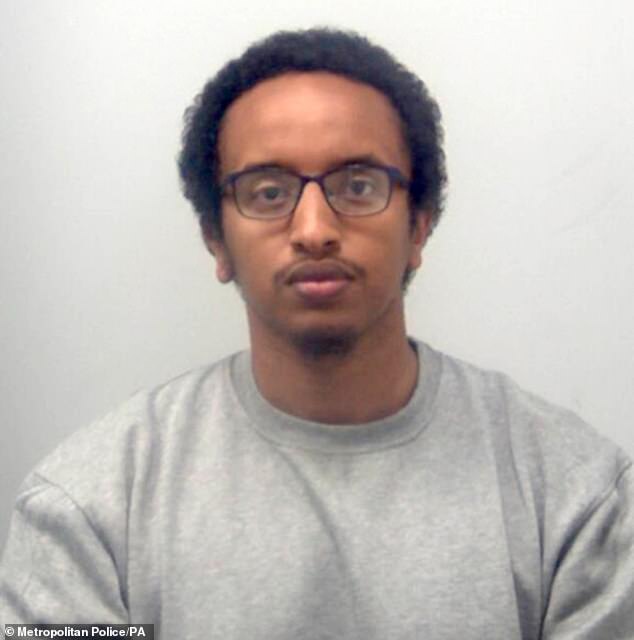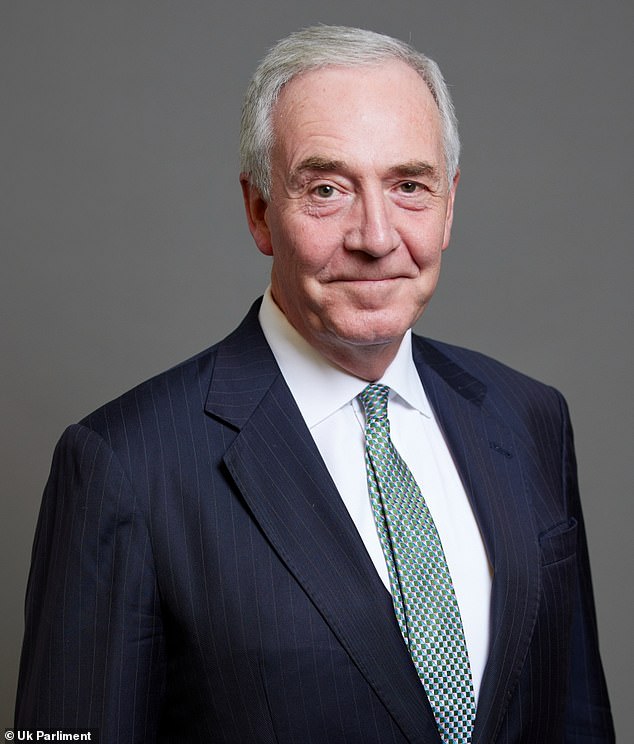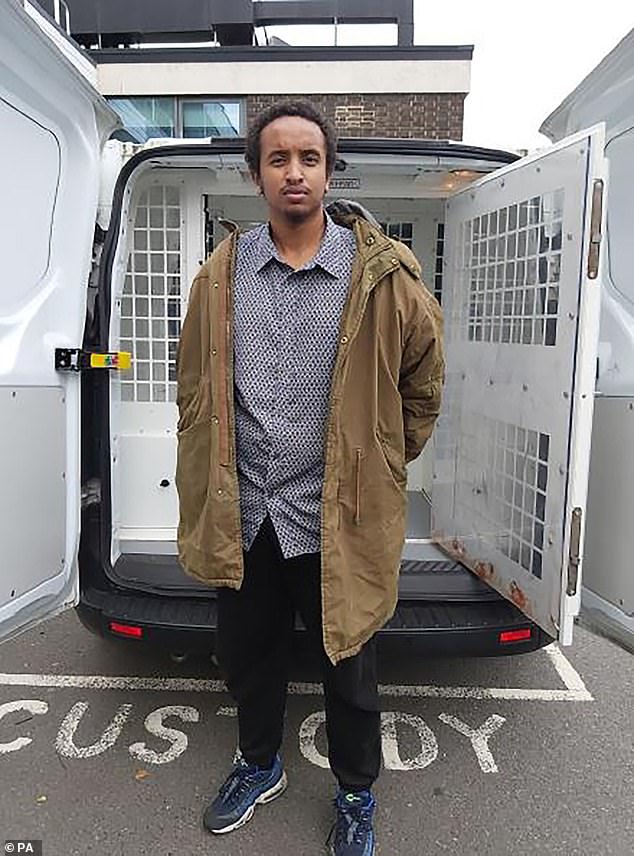The murderer of Tory MP Sir David Amess was described as a ‘great person’ by a police counter-terrorism official during a botched risk assessment before the killing.
An officer from the government’s flagship anti-extremist programme, Prevent, made the extraordinary comment in an e-mail to a colleague, an official review revealed yesterday.
Prevent’s work with Ali Harbi Ali was later dropped.
The revelation came as the Amess family accused Home Secretary Yvette Cooper of leaving them ‘retraumatised’ in the wake of the new review by leading barrister Lord Anderson.
Ali was referred to Prevent seven years before the Islamic State fanatic stabbed the veteran Conservative more than 20 times at a constituency surgery in Essex.
Lord Anderson’s report described how a Prevent ‘intervention provider’ met Ali, then a sixth former, only once after his school raised concerns he was being radicalised.
Following the meeting at a McDonalds in Croydon in January 2015 the intervention provider described Ali as a ‘pleasant and informed young man’ in a report.
They added that Ali ‘does not agree’ with extremists including Islamic state and al-Qaeda, and ‘has no grievances against the west or other faiths or groups’.

Conservative MP Sir David Amess (pictured) was murdered at a constituency surgery session in Leigh-on-Sea, Essex, in 2021

Ali Harbi Ali (pictured) was described as a ‘great person’ by a police counter-terrorism official during a botched risk assessment before the killing
An unnamed Prevent counter-terrorism case officer – a Scotland Yard civilian police worker – then emailed their colleague: ‘He seems to be a great person, are you still all right to do a lesson at his school, do you think it is worth it?’
Lord Anderson’s report went on: ‘Ultimately, the intervention provider accepted what they described as a decision taken by others that no further meetings were required.’
The 156-page report also said a document describing the intervention provider’s contact with Ali was ‘overlooked’ by the Home Office.
It had been sent to civil servants in 2021 but was not provided to a previous review of the case, and has only now come to light.
It was disclosed to Lord Anderson only on June 25.
‘I told the Home Office that I considered this a significant matter, and asked that checks be made to ensure that no further sources of relevant evidence had been disregarded,’ yesterday’s report said.
‘The Home Office responded with an assurance that it has conducted a thorough search and that no additional information has been detected.’
The report also described how a Metropolitan Police detective inspector on the Prevent team asked for a check of Ali’s social media in 2015, but ‘there is no evidence that this was ever performed’.

The report by Lord Anderson (pictured) described how a Prevent ‘intervention provider’ met Ali, then a sixth former, only once after his school raised concerns he was being radicalised
The developments will deepen concerns over the beleaguered Prevent scheme and the Government’s attempts to improve the response to extremism.
The Amess family described a letter sent to them by the Home Secretary shortly before the report’s publication yesterday as a ‘calculated exercise in damage limitation’.
Ms Cooper’s letter to the Amess family said: ‘I realise the seriousness of these failings and it reflects the deep concerns you have long held about what went wrong.
‘Lord Anderson acknowledges improvements made to Prevent since then but also identifies further important opportunities for change in the wider Prevent system.’
She insisted the leading barrister’s review had been ‘incisive’ and ‘thorough and considered’.
But Amess family spokesman Radd Seiger described the letter as ‘an insult’ and accused ministers of pursuing ‘piecemeal’ reform of Prevent.
Relatives had been given ‘next to no notice’ of Lord Anderson’s report and were not given advance sight of the document, he added.
‘They are deeply hurt and angered, by the utterly dismissive tone as well as the timing of the Home Secretary’s letter,’ Mr Seiger said.
‘It is difficult to see it as anything other than a calculated exercise in damage limitation, designed not to support the family in their search for answers but to protect the Government following its failings.
‘This supposed act of courtesy has left the family retraumatised, blindsided, and feeling marginalised in a process that should have had their voices and wellbeing at its heart from the outset.’

Ali Harbi Ali pictured after being arrested for the murder of MP Sir David Amess in 2021
Lord Anderson’s report also studied Prevent’s response to concerns raised about Southport knifeman Axel Rudakubana.
Prevent failed to put the teenager on a deradicalisation scheme before he killed Bebe King, six, Elsie Dot Stancombe, seven, and nine-year-old Alice da Silva Aguiar at a Taylor Swift-themed dance class, and injured 10 others, last summer.
Lord Anderson concluded: ‘Prevent failed in both cases’.
In one of 10 recommendations to ministers, the KC said the scheme should ‘up its game’ in dealing with online radicalisation.
He added ‘the jury is still out’ on whether a series of recent changes will improve Prevent’s operation.
The review said Prevent should continue to address individuals who are obsessed with violence but do not fall into a clear terrorist category.
The recommendation reflects how the threat posed by Rudakubana was partly ignored by police and officials because of the ‘absence of a distinct ideology’.
Lord Anderson also said Prevent should be far more ‘transparent’ about its activities.
The Home Secretary told MPs she would ‘act immediately’ on the findings of the review.
Chris Walker, who represents the three Southport bereaved families, said the report showed ‘opportunities to intervene were then lost’, adding: ‘Real change needs to come in order to prevent other families going through what my clients face.’
A separate inquiry into the Southport killings resumed in the autumn.
Dr Paul Stott, head of security and extremism at think-tank Policy Exchange, said: ‘A problem with Prevent has been its lack of focus on the core threat of Islamism, which outstrips all other terrorist threats.
‘It is not clear the system can or should cope with adding lots of additional challenges, be it violence fascination or issues around mental health.
‘It is reasonable for the government to examine the possibility of connecting Prevent to a broader safeguarding and violence prevention system, but separating the two – with Prevent focused on existing ideological threats and another intervention mopping up mental health and violence fascination – would be more sensible.’












